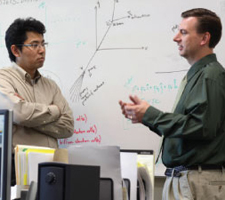Baylor graduate research programs rising in the ranks of the nation’s best
 Eight years after launching Vision 2012, Baylor’s traditional emphasis on undergraduate education is stronger than ever, as evidenced in programs like the Robert Foster Cherry Award for Great Teaching (the single largest monetary award of any national higher ed teaching honor) and in statistics like Baylor’s average class size (nearly half of undergrad classes have fewer than 20 students, compared to only a third of classes in 2002).
Eight years after launching Vision 2012, Baylor’s traditional emphasis on undergraduate education is stronger than ever, as evidenced in programs like the Robert Foster Cherry Award for Great Teaching (the single largest monetary award of any national higher ed teaching honor) and in statistics like Baylor’s average class size (nearly half of undergrad classes have fewer than 20 students, compared to only a third of classes in 2002).
At the same time, the strength of Baylor’s research-intensive graduate programs has grown year by year — efforts that were externally validated in the latest numbers from Academic Analytics, a company that looks at faculty productivity (journal publications, grants received, academic awards, etc.) to rank doctoral programs at research universities.
Several Baylor doctoral programs ranked among the nation’s best. Religion, a long-established premier doctoral program at Baylor, ranked 18th nationally, as did philosophy — a young program that did not begin recruiting doctoral students until 2004. Political science and sociology, two other relatively new programs, also ranked in the top quarter of programs in their respective fields.
“This remarkable transition has been catalyzed by a lot of hard work from both existing and new faculty collaborating across disciplines to the benefit of our students,” said Dr. Lee C. Nordt, professor of geology and dean of the College of Arts and Sciences at Baylor. “Baylor is becoming known not only as a disseminator of information but as an institution of discovery.”
Sic ’em, Baylor researchers!

